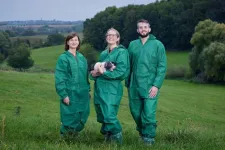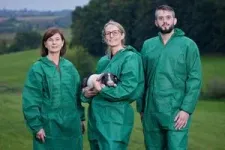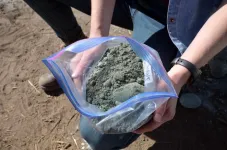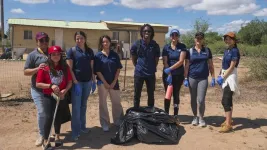(Press-News.org) Which sustainability goals do people in Germany find more important: Animal welfare? Or environmental protection? Human health is another one of these competing sustainability goals. A team of researchers from the Department of Agricultural and Food Market Research at the University of Bonn have now found that consumers surveyed in their study would rather pay more for salami with an “antibiotic-free” label than for salami with an “open barn” label that indicates that the product promotes animal welfare. The results have now been published in the journal “Q Open.”
The animal husbandry sector faces a complex set of challenges as a result of various competing interests. “Sustainability goals such as animal welfare, environmental protection and human health can quickly conflict with one another,” says Jeanette Klink-Lehmann from the Department of Agricultural and Food Market Research at the Institute for Food and Resource Economics at the University of Bonn. At the same time, stricter standards in animal husbandry could have an impact on competitiveness because it is not always possible to compensate for any associated increases in costs with higher consumer prices. This can threaten the viability of family-run farms and also impact rural communities. “In order to develop appropriate policy conditions, it is vital to investigate and clarify these conflicts in the sustainability debate,” says Prof. Monika Hartmann, Head of the Department of Agricultural and Food Market Research at the University of Bonn.
A team from the Department of Agricultural and Food Market Research at the University of Bonn investigated consumer preferences for various different sustainability goals. Their study focused on three main conflicts between animal welfare and environmental protection, human health and animal health and finally human health and animal welfare. The research team analyzed the consumer preferences for these conflicting sustainability goals. They also investigated how positive information on safeguarding certain goals and information on potential conflicts can influence these preferences. Psychographic (e.g. the level of awareness for the environment, health and animal welfare) and socio-demographic factors (such as the sex and age of the participants) were taken into account in the analyses in order to explain possible differences between the preferences expressed by consumers.
In this experimental study, one group of participants were provided with information on the advantages of the pig husbandry practices associated with two fictitious labels: the “open barn” label promoting animal welfare and the “antibiotic-free” label that helps protect human health. A second group not only received this information but were also given information on potential negative effects of the production practices. A third group – which served as a control group – was only provided with information on the University of Bonn. A daily trip to the supermarket was then simulated and participants were asked to choose between two different salami products in three different scenarios, whereby the salami products each represented different sustainability goals. The willingness of consumers to pay for the chosen salami was also analyzed in each case.
The team of researchers discovered that most people chose a salami with a sustainability label and were also willing to pay more for it. However, the participants were more willing to pay for a salami with the “antibiotic-free” label than for a salami with the “open barn” label. “The results show that personal health is more important to people than animal welfare,” says Jeanette Klink-Lehmann. The study also demonstrated that animal welfare considerations were more important to people than environmental protection. Furthermore, the results demonstrate that people’s willingness to choose a more sustainable alternative is highly dependent on the price.
The researchers at the University of Bonn demonstrated that the extent to which information has an effect is dependent on which sustainability aspects are being considered and how the information is presented. “We were surprised to discover that if consumers were only provided with positive information, the willingness to pay more for ´open barn´ salami in comparison to the ‘no label’ salami increased but this was not true for ‘antibiotic-free’ salami,” says Jeanette Klink-Lehmann. The lead author has interpreted this to mean that although consumers perceive the “antibiotic-free” animal product as being beneficial for their own health, this advantage is sufficiently communicated by the label itself and additional information has no influence on consumer preferences. In contrast, the team believes that consumers might be less aware of the positive effects of “open barn” production on animal welfare. In this case, the positive information provided to consumers improved their level of knowledge and thus their willingness to pay more for salami with the “open barn” label.
To ensure full transparency, it was important to inform consumers not only about the benefits but also the potential disadvantages of a production method. “However, our results suggest that such a strategy comes at a price,” says Milan Tatic, a doctoral candidate in the Department of Agricultural and Food Market Research at the University of Bonn. The team believes that two-sided information has a neutralizing effect. “This means that we were unable to detect any positive influence on the willingness of consumers to pay more for a particular product in comparison to the control group when the positive information was paired with information on potential negative effects of the production method.”
“The results demonstrate that those participants who place importance on animal welfare and human health were willing to pay more for ‘open barn’ salami,” says Prof. Hartmann, who is a member of the transdisciplinary research area “Sustainable Futures” at the University of Bonn alongside her co-author Jeanette Klink-Lehmann. Furthermore, the study showed that health-conscious people were willing to pay more for ‘antibiotic-free’ salami in comparison to a ‘no label’ variety. “Surprisingly, the latter is also true for those people who place particular importance on animal welfare,” according to Prof. Hartmann.
Funding:
The study was funded by the Ministry for Environment, Agriculture, Conservation and Consumer Protection of the State of North Rhine-Westphalia (MULNV) within the framework of the teaching and research focus “Environmentally friendly agricultural practices suitable for local conditions” (Umweltverträgliche und Standortgerechte Landwirtschaft, USL). The publication of the study was also supported by the Open Access Publication Fund of the University of Bonn.
Publication: Jeanette Klink-Lehmann, Milan Tatic, Nina Weingarten, Monika Hartmann: Sustainability trade-offs in animal husbandry: consumers’ choice when they can't have it all, Q Open, https://doi.org/10.1093/qopen/qoad025
Media contact:
Jeanette Klink-Lehmann
Department of Agricultural and Food Market Research
Institute for Food and Resource Economics
University of Bonn
Tel. +49 (0) 228 73-3580
E-mail: jeanette.klink@ilr.uni-bonn.de
Web: www.mafo.uni-bonn.de
END
More animal welfare or more environmental protection?
Researchers at the University of Bonn are investigating conflicting goals in animal husbandry. Human health appears to be the most important priority
2023-10-24
ELSE PRESS RELEASES FROM THIS DATE:
Mass General Brigham names Paul Anderson Chief Academic Officer
2023-10-24
Following a national search, Paul Anderson, MD, PhD, has been named Chief Academic Officer for Mass General Brigham. Anderson, who has been serving in this role on an interim basis since January 1, oversees Mass General Brigham’s world-class research and teaching enterprise, which includes two academic medical centers — Mass General Hospital and Brigham and Women’s Hospital — and three specialty hospitals. Mass General Brigham is the largest hospital system-based research enterprise in the nation, with an annual ...
Biological fingerprints in soil show where diamond-containing ore is buried
2023-10-24
Researchers have identified buried kimberlite, the rocky home of diamonds, by testing the DNA of microbes in the surface soil.
These ‘biological fingerprints’ can reveal what minerals are buried tens of metres below the earth’s surface without having to drill. The researchers believe it is the first use of modern DNA sequencing of microbial communities in the search for buried minerals.
The research published this week in Nature Communications Earth and Environment represents a new tool for mineral exploration, where a full toolbox could save prospectors time and a lot of money, says co-author Bianca Iulianella Phillips, a doctoral candidate at ...
Adding crushed rock to farmland pulls carbon out of the air
2023-10-24
Adding crushed volcanic rock to cropland could play a key role in removing carbon from the air. In a field study, scientists at the University of California, Davis, and Cornell University found the technology stored carbon in the soil even during an extreme drought in California. The study was published in the journal Environmental Research Communications.
Rain captures carbon dioxide from the air as it falls and reacts with volcanic rock to lock up carbon. The process, called rock weathering, can take millions of years ...
Neuroscientist Huda Akil, Ph.D., wins National Medal of Science
2023-10-24
She has explored the brain’s secrets for more than 50 years, delving deep into the genes, proteins and cells that help govern our emotions and moods, and our responses to pleasure and pain.
And today, Huda Akil, Ph.D., received the nation’s highest scientific honor – the National Medal of Science -- for those contributions and their impact on humankind’s understanding of depression, anxiety, addiction and more.
Akil, a neuroscientist at the University of Michigan Medical School and Michigan Neuroscience Institute, and her fellow awardees were honored at the White House in a ceremony ...
AZ-HOPE receives $3.2M HRSA grant to support future health care professionals
2023-10-24
Arizona Health Opportunities Pathways to Excellence, a program of the University of Arizona Health Sciences Office of Equity, Diversity and Inclusion, received a $3.2 million grant from the U.S. Department of Health and Human Services to help students from disadvantaged backgrounds achieve their dreams of becoming health care professionals.
Arizona Health Opportunities Pathways to Excellence, or AZ-HOPE, is a collaboration between academic and community partners to support students’ educational endeavors and help them overcome barriers on the pathway ...
Cleveland Clinic-led trial finds that atrial fibrillation patients undergoing TAVR and Watchman™ procedures together have similar outcomes to using blood thinners after TAVR
2023-10-24
Tuesday, October 24, 2023, Cleveland: Findings from a trial led by Cleveland Clinic show that patients with atrial fibrillation undergoing a transcatheter aortic valve replacement (TAVR) at the same time as a left atrial appendage occlusion (LAAO) procedure using the Watchman™ device had similar outcomes when compared to patients getting TAVR in addition to medical therapy or blood thinners.
Results from the “Safety and Efficacy of Left Atrial Appendage Occlusion at the Time of Transcatheter Aortic Valve Replacement — ...
Upadacitinib in active Crohn’s disease: no added benefit proven due to lack of comparative studies
2023-10-24
Like several immunosuppressive biologics, the JAK inhibitor upadacitinib is also approved for the treatment of Crohn's disease. Commissioned by the Federal Joint Committee (G-BA), the Institute for Quality and Efficiency in Health Care (IQWiG) has now investigated in an early benefit assessment whether the drug offers an added benefit versus the appropriate comparator therapy to patients with moderate to severe active Crohn's disease who have had an inadequate response, lost response or are intolerant to conventional therapy or a biologic agent.
Therefore, an added benefit is not proven due to a lack of suitable study data. The ...
Adapting to climate change: Individuals take action while governments plan
2023-10-24
UNIVERSITY PARK, Pa. — While governments may take the lead in planning and financing climate change adaptation measures, such as incentivizing green infrastructure, individuals currently are most often the ones implementing actions to adapt to climate change, according to new research. The analysis, conducted by an international consortium of researchers from 20 institutions, including Penn State, in 12 countries, published in Nature Climate Change.
“The evidence suggests that individuals and households are the primary adaptation actors — the ones actually implementing ways to ...
New clues to early development of schizophrenia
2023-10-24
Philadelphia, October 24, 2023 – Schizophrenia is a severe neuropsychiatric disease that remains poorly understood and treated. Schizophrenia onset is typically in adolescence or early adulthood, but its underlying causes are thought to involve neurodevelopmental abnormalities. Because human prenatal and postnatal brain tissue is exceedingly difficult to procure and therefore study, researchers have had limited opportunities to identify early disease mechanisms, especially during the critical prenatal period. Now, a pair of studies that appear in Biological Psychiatry, ...
What an animated taco reveals about curiosity and patience
2023-10-24
DURHAM, N.C. -- Curiosity paradoxically increases people’s patience for an answer, while simultaneously making them more eager to hear it, finds a new study by Duke neuroscientists.
The research might help teachers and students alike by describing a side of curiosity that encourages us to stay engaged instead of seeking immediate relief.
Die-hard fans of the Hulu show, "The Bear" are left on the edge of their seats each Sunday, wondering what's going to happen in the scrappy Chicago hotdog shop next week. But the new study from Duke helps explain why viewers may choose to avoid spoilers ...
LAST 30 PRESS RELEASES:
$3 million NIH grant funds national study of Medicare Advantage’s benefit expansion into social supports
Amplified Sciences achieves CAP accreditation for cutting-edge diagnostic lab
Fred Hutch announces 12 recipients of the annual Harold M. Weintraub Graduate Student Award
Native forest litter helps rebuild soil life in post-mining landscapes
Mountain soils in arid regions may emit more greenhouse gas as climate shifts, new study finds
Pairing biochar with other soil amendments could unlock stronger gains in soil health
Why do we get a skip in our step when we’re happy? Thank dopamine
UC Irvine scientists uncover cellular mechanism behind muscle repair
Platform to map living brain noninvasively takes next big step
Stress-testing the Cascadia Subduction Zone reveals variability that could impact how earthquakes spread
We may be underestimating the true carbon cost of northern wildfires
Blood test predicts which bladder cancer patients may safely skip surgery
Kennesaw State's Vijay Anand honored as National Academy of Inventors Senior Member
Recovery from whaling reveals the role of age in Humpback reproduction
Can the canny tick help prevent disease like MS and cancer?
Newcomer children show lower rates of emergency department use for non‑urgent conditions, study finds
Cognitive and neuropsychiatric function in former American football players
From trash to climate tech: rubber gloves find new life as carbon capturers materials
A step towards needed treatments for hantaviruses in new molecular map
Boys are more motivated, while girls are more compassionate?
Study identifies opposing roles for IL6 and IL6R in long-term mortality
AI accurately spots medical disorder from privacy-conscious hand images
Transient Pauli blocking for broadband ultrafast optical switching
Political polarization can spur CO2 emissions, stymie climate action
Researchers develop new strategy for improving inverted perovskite solar cells
Yes! The role of YAP and CTGF as potential therapeutic targets for preventing severe liver disease
Pancreatic cancer may begin hiding from the immune system earlier than we thought
Robotic wing inspired by nature delivers leap in underwater stability
A clinical reveals that aniridia causes a progressive loss of corneal sensitivity
Fossil amber reveals the secret lives of Cretaceous ants
[Press-News.org] More animal welfare or more environmental protection?Researchers at the University of Bonn are investigating conflicting goals in animal husbandry. Human health appears to be the most important priority





